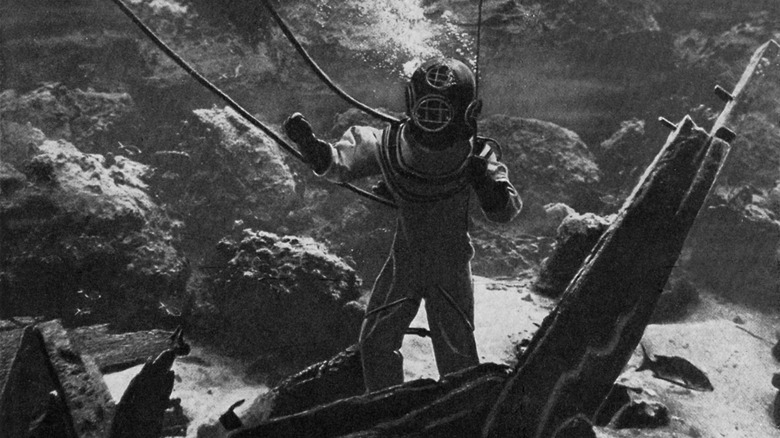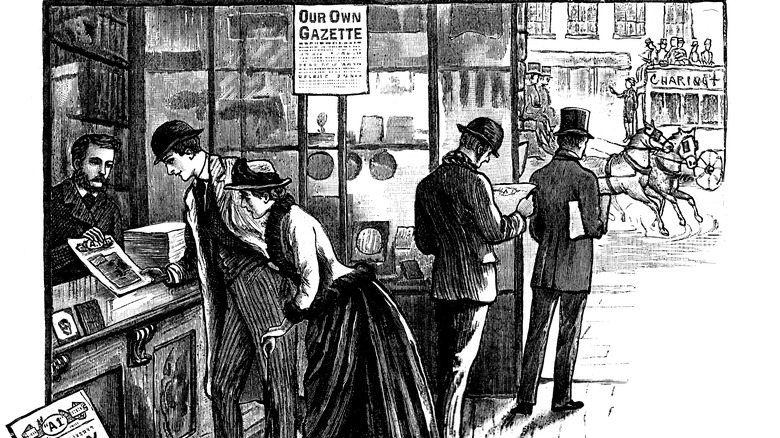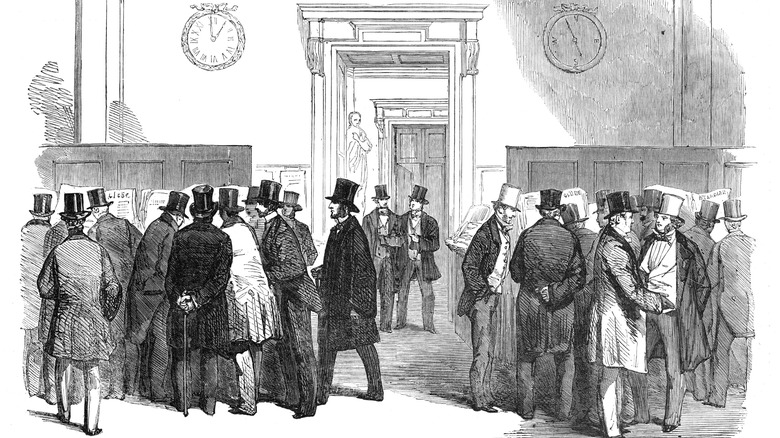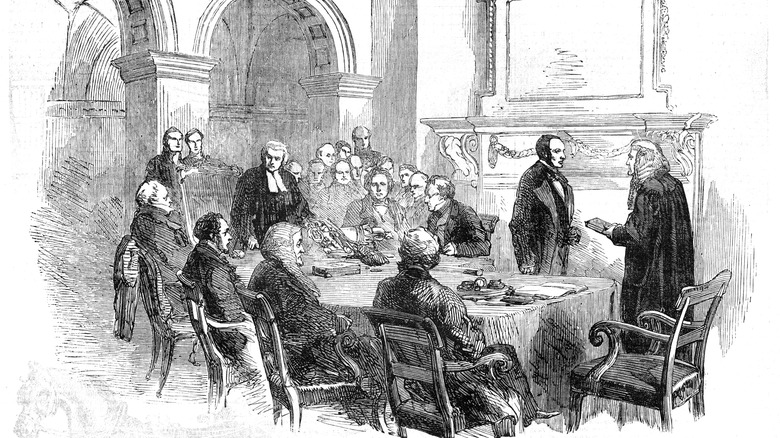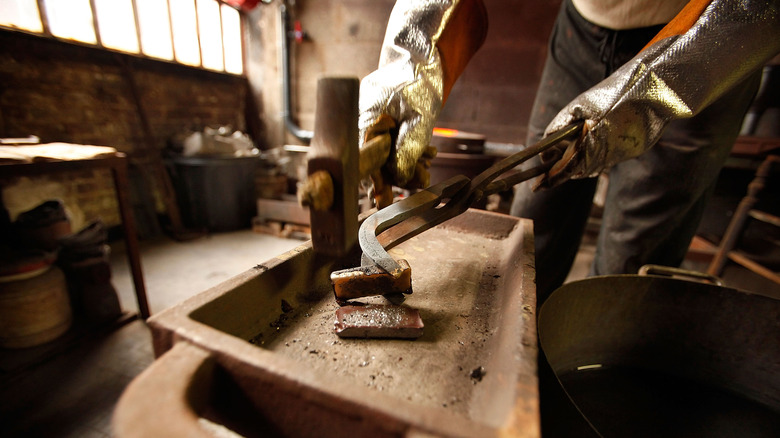The Wild Story Of The New England Gold Hoax Of 1898
If you've ever looked at the ocean and thought, I wonder if I could get gold out of that thing, you wouldn't be the only one. It's not an easy question to answer, but a study from 1989 found that there's about a gram of gold in every 100 million metric tons of seawater, per ScienceDirect. And according to Forbes, there's about $771 trillion worth of bars in the ocean at large. So, some!
This initial discovery came in 1872 when chemistry was still a new and exciting practice — heavy on the practice, per NC State University. At the time, the sentiment was the same as it is today: There's gold in them waters alright, just in trace amounts. But when that discovery made its way into newspapers across New England in 1897, one broke and bedridden man had the bright idea that someone's got to give mining it a try, whether the process is real or not.
The broke bed-rider in question was Reverend Prescott F. Jernegan. And while his title in and of itself makes his eventual transgressions wonderfully ironic, it should be prefaced that he wasn't actively preaching while curating a totally made-up mining process and completely fooling hundreds of investors with it, per Martha Vineyard Times. But once a reverend, always a reverend. Sort of. Titles aside, here's how he ended up running "The Most Amazing Swindle Known in Modern Times," per the Fairfield News and Herald.
A minister with a mischievous side
According to The Dukes County Intelligencer, via Martha's Vineyard Museum, Prescott Ford Jernegan seemed to have sticky fingers early in life. As a young boy, he lived in Honolulu between stints spent on whaling ships with his father, who was an accomplished sea captain and whaler. On and off deck he loved to ruffle feathers, like snatching a crewman's hats and throwing it overboard, or taking off with a horse and buggy at just 3 years old, according to his sister, Laura Jernegan.
When Jernegan reached his early teens, he was well-traveled, well-read, and well on his way to letting everyone know it, but first he became a born-again Christian, per Dukes County Intelligencer. He still flirted with thievery, like attempting to beat the system of a Monte Carlo bank during some summer travels across Europe. He went on to graduate from ministry school, marry his childhood flame, and bounce between Baptist churches throughout his twenties.
He adopted a strong (and ironic) desire to help the poor and disadvantaged, but his congregations weren't so warm to those endeavors. During a stint in Middletown, Connecticut, he even tried not taking a salary and only living off a percentage of the church's weekly collections, per the New Haven Morning Journal and Courier. HIs unorthodox approaches were not well received, and he eventually had to move back home to Massachusetts.
Typhoid tribulations bring on the inspiration
How exactly Prescott Jernegan came up with the initial idea for his scam isn't known due to varying accounts recorded in newspapers versus what his family's journals relay. One detail that is consistent is that the idea came to him while breaking a nasty sweat from typhoid fever, per Martha's Vineyard Times.
According to The Dukes County Intelligencer, shortly after returning home to his wife, Jernegan became ill for six weeks. And rather than hang around and care for her husband whom she'd hardly seen since her wedding day, his wife went to stay with some "friends" while he was cooped up with contagion. He began to question just about everything, as one does alone on their near-deathbed, but mostly his faith and the life decisions that came with it. He was already tired of being "...patronized by illiterate snobs. I had been underpaid, my mind had become embittered by a thousand acts of injustice," he told one reporter, per the New England Historical Society.
In the midst of an almost literal quarter-life crisis, his nurse (or brother, according to other sources) read him a brief article about a chemist who found trace amounts of gold in seawater, per Dukes County Intelligencer. Totally smitten by the vague alchemy of it all, a delusional Jernegan immediately latched onto finding a way to make something out of nothing.
Diving in, literally
In one of Prescott Jernegan's journals, via The Dukes County Intelligencer, he wrote, "...it instantly occurred to me that since gold was already contained in sea water it would be an easy matter to conceal more gold there, then sell the 'secret' for a large sum of money and disappear to parts unknown."
The whole "concealing more gold" bit would naturally involve some logistics. Luckily, he had a childhood friend named Charlie Fisher who was a diver — and just as much, if not more, of a schemer than the reverend, per the St. Croix Historical Society. When the two reconnected, Fisher had just left his job as a floorwalker for a dry goods store in Brooklyn. During his three years there, he was known both for his unscrupulous charm and stealthy antics around the cash registers, according to the Portland Daily Press.
The Maine Historical Society reports that Fisher was most likely the one who came up with the entire system for swindling investors. He claimed he had previously served in the English Army, per the New England Historical Society. If this was true, it might have been the source of his diving experience, and some of the qualifications to organize the technical aspects of this flimflam. However he learned to dive and make bogus gold-collecting contraptions, he was just the man Jernegan needed.
Get a bucket and some mercury
As for how these guys ran the most successful heist in New England at the time, it was tragically simple. The gold gobbler — not what the contraption was officially called, but probably should have been — was a wooden box lined with lead, into which would-be investors tossed a bit of mercury, per the St. Croix Historical Society. Oh, and it was battery-operated, of course. The prop was called an "accumulator."
Prescott Jernegan told prospectors that the mercury would absorb the gold floating around in the salt water, and encouraged them to bring their own quicksilver to prove the process worked, according to the Kennebunkport Historical Society. Located on the seafloor near the accumulator was a set of copper lines headed for the shoreline. When the box was lowered into the ocean, Charlie Fisher would guide himself along the seafloor with the lines, his own batch of gold-infused mercury in hand, per the Maine Historical Society. Once he made his way to the accumulator, he'd fling open the hatch, dump out the lame, not-gold-infused mercury, and replace it with the good stuff.
Meanwhile, Jernegan and a couple of not-so-chemistry-inclined businessmen would sit overnight on the pier to ensure that the box wasn't being tampered with. In the morning, after the accumulator was brought to the surface, the group headed over to an assayer to test the loot. And what do you know, there was plenty of coin (about $4.50 worth) to be found in their mercury, per the Fairfield News and Herald.
Say hello to the Electrolytics Marine Salts Company
The scuttlebutt quickly traveled across New England, bringing skeptical stakeholders to test out this magical device that was supposedly sucking gold nuggets from the ocean. According to American Heritage, one capitalist actually had the wherewithal to bring a chemist out to size up the process. The chemist instructed Prescott Jernegan to stir the sea water with his own hands, rather than let the battery do the work. Luckily for Jernegan, he was wearing a gold ring that day that the chemist failed to notice.
This "passed" test sent investors diving for their pocket books, and within the month the Electrolytics Marine Salts Company was born with $1 million in investments (per the New England Historical Society) and $10 million of available stock, per the St. Croix Historical Society. Jernegan chose Lubec, Maine, for the plant, both on account of its remoteness to allow for those proprietary swaps, but also, ostensibly, for the tides. Jernegan had done his research with the United States Coast Survey, and found that the tides were ideal for seawater gold mining operations based on the little amount of science that said so.
The research totally sold investors on the location. Soon, an old grist mill was converted for the operation, per the Maine Historical Society. The gold extraction plant had 240 accumulators, which stayed underwater for a few weeks before coming to the surface. Charlie Fisher kept on as usual, salting 60 boxes with gold each week.
Butt Hurt Billy the Tattle Teller
There was a third, and much lesser known, accomplice to the New England gold hoax. His name was William Phelan, and according to the Portland Daily Press, he was a private investigator who played a role in the scheme's beginnings. Beyond possibly getting Charlie Fisher onboard (or underwater, more so), his main job seemed to be managing the line that Fisher used to guide himself across the ocean floor during the early mercury exchanges that fooled investors, according to the New England Historical Society.
Once the Electrolytics Marine Salts Company took off, Phelan felt that he deserved more compensation for his involvement. He must have sensed that Prescott Jernegan and Fisher wouldn't agree, and threatened to go to the press if they didn't cooperate, according to The Dukes County Intelligencer. Apparently they didn't think ol' Billy was worth the extra dime, and so while Phelan ran to the newspapers with his story, Fisher ran onto a boat headed for New Zealand with a suitcase stuffed with $100,000, and Jernigan onto another headed for Europe with $150,000, per Martha's Vineyard Times.
Prescott Jernegan cashes out
Days before all the dirty details of the scam fully hit the press, an article by the New York Daily Tribune subtitled "Officers Say That the Rev. Mr. Jernegan's Departure Was Perfectly Regular" revealed that the ex-minister had his brother use a false name to take out a handsome amount of government bonds before heading to Europe, per the St. Croix Historical Society.
It seems he had been planning for his trip across the pond for a couple weeks, as the New York Daily Tribune goes on to report how he had opened an account in Brooklyn and deposited $98,000 worth of checks into it. A few days later, he requested $95,000 in cash with the reason being, "... he was buying machinery, and did not want to be known by his checks." Nobody had seemed to panic yet, since the Electrolytic Marine Salts Company was still pulling up barrels of gold, and the company's president, A.B. Ryan, had known Prescott Jernegan was planning a business trip to Europe.
Even the transferring of bonds seemed understandable as his treasurer, A.P. Sawyer, said, "Bonds are more easily negotiable in London than American money, and I can see why he wished to do that," per New York Daily Tribune. But shortly after that article, another by the The Providence News affirmed Phelan's story that the entire operation was a flimflam. Jernegan was to be arrested upon arrival in Havre, France. But, due to ..."the lack of the necessary papers," he hopped on a train unbothered to Paris.
The Electrolytic Marine Salts Company dissolves
With Prescott Jernegan and Charlie Fisher overseas, along with confirmation that these super-secret, battery-charged buckets were completely useless, operations at the oceanic gold mine came to an immediate halt, according to the New York Tribune. Hundreds of workers were laid off, and investors were expected to eat the loss of their $10 million given. On top of that, the company's treasurer died less than a week after the scandal broke, per the New England Historical Society.
To add insult to injury, Jernegan and Fisher received their shares' worth back upon dissembling the company, with Jernegan and Fisher receiving 45 cents on the dollar, per the Portland Daily Press. Some directors believed that the plant could still make stacks since scientists had supposedly backed the process, and were willing to see it through in hopes that at least some amount of gold could be extracted from sea water, per the New Haven Morning Journal and Courier.
But as the months went by, it was finally confirmed that the tests resulted in no cigar — er, gold anyway. Well, aside from the tooth fillings and other random treasures Fisher had planted in the tanks. The company was set to have a shareholder meeting about whether or not to move forward in continuing efforts, but nobody showed up, per the Daily Kennebec Journal. The only real to-dos left were to sue Jernegan and Fisher for fraud. As for the plant, an investor planned to buy it and turn it into a sardine factory, per The Evening Times.
Jernegan Wiesel's his way out of prosecution
The company was left with $313,000 worth of assets, leaving about 30 cents to be paid back on outstanding stocks, per the Portland Daily Press. According to the New England Historical Society, Prescott Jernegan was wise to only take out $100,000 from the company as it wasn't beyond his share of proceeds. This made it basically impossible to prosecute him for embezzlement, per the St. Croix Historical Society.
He had also returned $85,000 while he was still in Paris (most likely from a guilty conscience), which certainly helped keep up his facade to investors, according to American Heritage. Jernegan then said that Charlie Fisher was the one who had taken off with the "secret formulas" and claimed he was trying to chase him down so operations could start back up again, per the New England Historical Society. According to Jernegan, the contribution was his effort to repair some of the busted accumulators and help keep business rolling while the boys back in Maine were trying to test the actual process, per American Heritage
However, incriminating correspondence between Jernegan and Fisher would soon surface, and it zapped all hope stockholders had in the pair's bogus gold mining endeavor. The reverend eventually had to come back to the States to settle his suit with the Electrolytic Marine Salts Company. American Heritage reports that, miraculously, he was able to skate by without charges, but was left pretty broke from the whole ordeal.
Fisher disappears down under
As for Charlie Fisher, aka The Alchemist, he supposedly made it to New Zealand and lost touch with Prescott Jernegan thereafter, per Martha's Vineyard Times. He died a few years later in Australia. What was left to know about Fisher were the details around how he managed to keep up with salting the accumulators with enough gold. Once operations were scaled up and Fisher was responsible for finessing 60 boxes a week, he would find scraps of metal to melt on site in a secret room at the plant, according to per the Maine Historical Society and American Heritage.
Before the scandal hit, things were getting fishy with Fisher around the facility. There had been a murder at the plant, along with a few damaged accumulators, and Fisher was nowhere to be found for an explanation, according to American Heritage. It was also about time for Jernegan and Fisher to get out of Dodge anyway, since plans to add nearly 20,000 more accumulators would have undoubtedly caused them to go bankrupt, according to the St. Croix Historical Society.
A fool's search for gold yields instant karma
Prescott Jernegan's conscience continued to wear on him after returning most of his loot to investors. Of the 1,000 people who had bought stock in the Electrolytic Marine Salts Company, many were elderly, widows, and hard-working laborers he'd met during his time as a minister, per the St. Croix Historical Society. And so, he returned another lump sum of what he'd run away with, leaving only $6,000 to his name, per The Dukes County Intelligencer.
Out of respite, he decided to use it toward one last attempt at extracting gold from the briny deep. In 1899, he connected with the British scientist whose work had originally planted the seed in Jernegan's feverish brain, Eduard Sonstadt, according to Dukes County Intelligencer. They worked on the process for about a year until Sonstadt died. By then, Jernegan was completely broke, per American Heritage.
After bouncing around back in America with various labor jobs (one of which included panning for gold on the beaches of Nome, Alaska), he landed in the Philippines where he would teach and write text books about the nation's history, per according to The Dukes County Intelligencer. Several years before his death in 1942, he wrote, "... I was sorry for my error, still more for the losses of investors, but my self respect never failed me ... no man climbs to great heights by calling himself names, or accepting as infallible other people's opinion of him."



